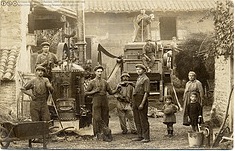Sep 29, 2011 2
The Dialectic of Job Creation
Scott Brown was asked recently to comment on Elizabeth Warren and he, predictably, refused. He said that he wasn’t going to weigh in on the field of Democratic candidates for the senate seat he now holds but, as a way of obliquely criticizing Warren, he also said that he wasn’t going to “beat up on job creators” either.
Brown was, of course, referring to Warren’s recent comments, construed by the Right as “a class warfare rant,” on taxation and the rich, but he was also simply demonstrating party discipline. Just as every Republican mechanically refers to “Obama’s job-killing healthcare plan,” thus replacing rational dispute about the pro’s and con’s of this latest attempt to address real problems with partisan nay-saying boiled down to a knee-jerk epithet, they are now responding to any discussion of raising taxes on the wealthiest Americans as an attack (“warfare”) on “job creators.”
While I find the equation of “the rich” and “job creators” problematic on many levels, the level I would like to focus on is that of the dialectic. Dialectical thinking, on which Elizabeth Warren relies in the comments under discussion, means putting things in context, focusing on complexity, and striving to understand how elements of any system influence and mutually define one another.
Consider the question, “Who creates jobs?” You could say, along with the Republicans (and devotees of Ayn Rand), that people who build companies create jobs. The logic behind this is not complicated: Companies can be seen as “a bunch of jobs,” so if you create a company, you have created jobs. QED.
But how do you “build a company”? Read the rest of this entry »
